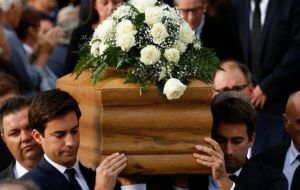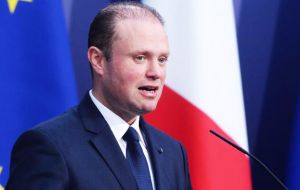MercoPress. South Atlantic News Agency
Malta political system barred from funeral of investigative journalist killed by a car bomb
 The crowd applauded when the coffin with Daphne Caruana Galizia arrived at the church in Mosta. She was known for her blog accusing politicians of corruption.
The crowd applauded when the coffin with Daphne Caruana Galizia arrived at the church in Mosta. She was known for her blog accusing politicians of corruption.  Her family barred Malta's leaders from attending the ceremony, while the EU executive has urged the authorities to find the “barbarous” assassins.
Her family barred Malta's leaders from attending the ceremony, while the EU executive has urged the authorities to find the “barbarous” assassins.  Ms Galizia was a harsh critic and effectively triggered an early election this year by publishing allegations linking PM Joseph Muscat to the Panama Papers scandal.
Ms Galizia was a harsh critic and effectively triggered an early election this year by publishing allegations linking PM Joseph Muscat to the Panama Papers scandal. Several hundred people in Malta have taken part in the funeral of a journalist killed by a car bomb attack that shocked the country last month. The crowd applauded when the coffin with Daphne Caruana Galizia arrived at the church in Mosta.
The 53-year-old was known for her blog accusing top politicians of corruption. Her family barred Malta's leaders from attending the ceremony. The EU executive has urged the authorities to find the “barbarous” assassins.
International experts, including from the FBI, are helping in the investigations but no arrests have been made so far. The government has offered a €1m reward for information about her murder on 16 October.
Archbishop Charles Scicluna, who led the Mass at Malta's biggest church, said: “We still do not know who killed Daphne. However hard you try to evade the justice of men, you will never escape from the justice of God. Repent before it is too late.”
Outside the church, the huge crowds sang the Maltese national anthem and some called for “justice”. Friday had been declared a day of mourning and flags flew at half-mast.
President Marie-Louise Coleiro Preca's office said she had been told via a third party that her presence in the ceremony “was not desired” by the journalist's family. And a spokesman for Prime Minister Joseph Muscat said: “The family has made it widely known that it does not wish the state authorities to attend.” Malta's opposition leader was also absent.
Ms Galizia was a harsh critic of the government and effectively triggered an early election this year by publishing allegations linking Mr Muscat to the Panama Papers scandal.
Mr Muscat and his wife denied claims they used secret offshore bank accounts to hide payments from Azerbaijan's ruling family - and he was returned to power in the election, despite the controversy.
The journalist's sons have called for him to step down over her killing. The editors of eight of the world's largest news organizations, including the BBC, called for the European Commission - the EU executive - to investigate the murder.
In response, Frans Timmermans, vice-president of the commission, urged authorities to leave “no stone unturned” in the case. “The eyes of Europe are on the Maltese authorities,” he said in a statement.
“We want the investigations to run their full course, so that any other related wrong-doings that may emerge can also be prosecuted and potential structural problems be resolved.”




Top Comments
Disclaimer & comment rules-

-

Read all commentsThe EU has the ability to instruct the government of the UK to accept immigrants from other parts of the union and to apply sanctions if they refuse. On the other hand when there is an assassination in tiny member country Malta, the EU is powerless to ensure that the crime is property investigated. Just goes to show what a total mess the EU is in and why it makes total good sense for the Britts to want to get out from under what is a recipe for dysfunctionality.
Nov 06th, 2017 - 12:01 am 0Just how much power do you want the EU to have? The UK signed up to free movement when we joined the EU, we didn't sign up to have the EU take over investigating criminal cases if they found them suspicious, and neither did Malta.
Nov 06th, 2017 - 08:55 pm 0If you want EU power to be limited, it has to be limited in all member states, large and tiny alike.
Commenting for this story is now closed.
If you have a Facebook account, become a fan and comment on our Facebook Page!